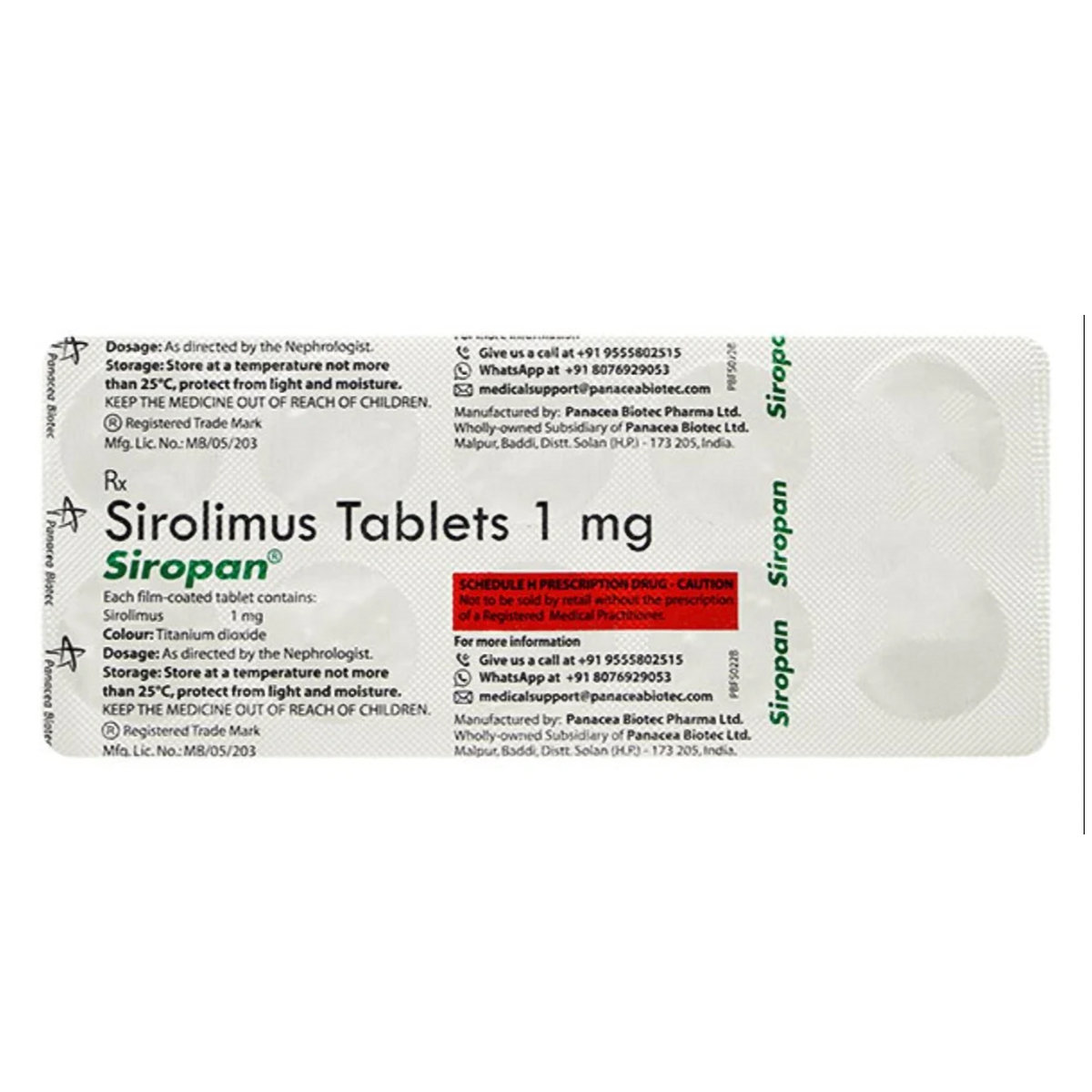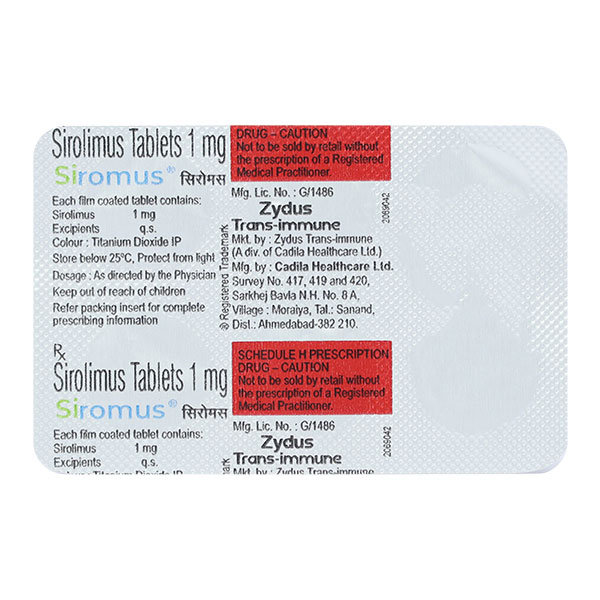Sirolimus
About Sirolimus
Sirolimus belongs to a class of drugs called 'immunosuppressants' used to prevent organ rejection after a transplant. Organ rejection occurs when a patient's immune system recognizes the donor organ as foreign and tries to eliminate it.
Sirolimus contains Sirolimus is an immunosuppressant. It weakens your body's defence system (immune system) to help your body accept the new organ as if it were your own. Thereby preventing organ rejection in transplanted patients and assisting the body in accepting the new organ.
Use Sirolimus as prescribed by your doctor. You are advised to use Sirolimus for as long as your doctor has prescribed it based on your medical condition. Some people may experience abdominal pain, diarrhoea, headache, fever, urinary tract infection, anaemia, nausea, arthralgia, pain, and oedema. Most of these side effects of Sirolimus do not require medical attention and gradually resolve over time. However, if the side effects persist or worsen, please consult your doctor.
To treat your condition effectually, continue using Sirolimus for as long as your doctor has prescribed it. Do not use Sirolimus without a doctor's advice if you are allergic to Sirolimus or other medicines. Consult your doctor before using Sirolimus if you are pregnant or breastfeeding. Avoid alcohol consumption with Sirolimus as it may increase the risk of severe adverse effects. Keep your doctor informed about your health condition and all the medicines you take before taking Sirolimus to rule out any side effects.
Uses of Sirolimus
Medicinal Benefits
Sirolimus contains Sirolimus is an immunosuppressant. It weakens your body's defence system (immune system) to help your body accept the new organ as if it were your own. Thereby preventing organ rejection in transplanted patients and assisting the body in accepting the new organ.
Directions for Use
Storage
Side Effects of Sirolimus
- Peripheral oedema
- Hypertriglyceridemia
- Hypertension
- Hypercholesterolemia
- Creatinine increased
- Abdominal pain
- Diarrhoea
- Headache
- Fever
- Urinary tract infection
- Anaemia
- Nausea
- Arthralgia
- Pain
- Thrombocytopenia
Drug Warnings
Therapeutic drug monitoring is required for all patients receiving Sirolimus. To treat your condition effectually, continue using Sirolimus for as long as your doctor has prescribed it. Do not use Sirolimus without a doctor's advice if you are allergic to Sirolimus or other medicines. Consult your doctor before using the Sirolimus if you are pregnant or breastfeeding. Avoid alcohol consumption with Sirolimus as it may increase the risk of severe adverse effects. Do not use Sirolimus in more than prescribed doses or longer duration as it may cause adverse effects. And also, keep your doctor informed about your health condition and all the medicines you take before taking Sirolimus to rule out any side effects.
Drug Interactions
Drug-Drug Interactions: Sirolimus may interact with other immunosuppressive agents (e.g. mycophenolate mofetil, mycophenolic acid), antihistamines (e.g. loratadine), anti-hypertensive medicines (e.g. losartan), and diabetic medicines (e.g. insulin glargine, insulin aspart). The relevance of a particular drug interaction varies from person to person. Always consult your healthcare provider before starting or stopping any medication, and also inform your doctor of all your medical conditions and ongoing therapies before prescribing this medication. Considering these, your doctor may check the drug interactions before prescribing this medication.
Drug-Food Interactions: Avoid consumption of alcohol, eating grapefruit or drinking grapefruit juice while you are taking Sirolimus.
Drug-Disease Interactions: Brief your doctor if you have a medical history of allergic reactions to medicines, Infections, PML (progressive multifocal leukoencephalopathy), angioedema, hyperlipidemia, liver disease, liver transplantation, lung dysfunction, lung transplant, renal dysfunction before taking Sirolimus.
Drug-Drug Interactions Checker List:
Safety Advice

Alcohol
cautionIt is advised to avoid alcohol intake since it may worsen the side effects.

Pregnancy
cautionConsult your doctor, and there is no substantial research yet on the use of Sirolimus in pregnant women.

Breast Feeding
cautionConsult your doctor, and there is no substantial research yet on the use of Sirolimus in breastfeeding/nursing mothers.

Driving
cautionDo not drive or operate machinery if you experience dizziness or drowsiness while using Sirolimus. Sirolimus can also sometimes cause dizziness/drowsiness; hence avoid driving in such situations. Seek medical attention if the symptoms persist longer.

Liver
cautionPlease consult your doctor if you have any concerns regarding using Sirolimus in patients with liver impairment. Your doctor will prescribe only if the benefits outweigh the risks.

Kidney
cautionPlease consult your doctor if you have any concerns regarding using Sirolimus in patients with kidney impairment. Your doctor will prescribe only if the benefits outweigh the risks.

Children
cautionThere is limited information available on the use of Sirolimus in children. Please consult your doctor.
Habit Forming
Patients Concern
Disease/Condition Glossary
Organ rejection occurs when a patient’s immune system recognizes the donor organ as foreign and tries to eliminate it.
FAQs
Sirolimus contains Sirolimus is an immunosuppressant. It works by weakening your body's defence system (immune system) to help your body accept the new organ as if it were your own.
No, it is a prescribed drug given by a physician for preventing specific medical conditions. Taking it on your own can cause unwanted side effects.
Sirolimus is safe if used in the dose and duration recommended by your doctor. Take it exactly as directed, and do not skip any dose. Follow your doctor's guidelines carefully and inform your doctor if any of the side effects disturb you.
Please do not stop using Sirolimus without consulting your doctor on your own. Continue using Sirolimus for as long as your doctor has prescribed it to treat your condition effectually. Do not be reluctant to speak with your doctor if you experience any difficulty while taking Sirolimus.
Take the missed dose as soon as possible. However, skip the missed dose and return to your regular dosing schedule if it is time for the next dose.




